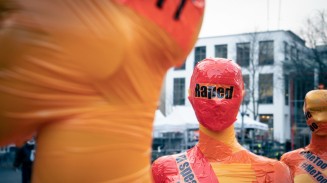The maracas-like plastic horns created by artist Carlinhos Brown is currently banned at the upcoming World Cup matches in Brazil. Despite endorsement from the Fédération Internationale de Football Association and have been blessed by Brazil's President Dilma Rousseff, federal officials said Brazil's answer to the vuvuzela is restricted for use in the football matches for safety reasons, The Wall Street Journal said.
The caxirola, resembling a flat-bottomed avocado, is a plastic noisemaker made from Brazilian sugar cane ethanol and filled with small plastic particles. A loud jangle could be produced from the noisemaker if shaken, and the noise is somewhere between a baby's rattle and a rainstorm on a tin roof, WSJ observed. Retailing in different colors at $14 each, the Brazil-made noisemaker actually carries the official ZFIFA seal.
The newspaper said that whatever noble reasons Brown was inspired to make the environmentally-friendly device, the Oscar nominee is reportedly paying the price for the controversy surrounding the elongated plastic horn that was introduced in the previous World Cup event in South Africa that produces a sound like a bellicose water buffalo. The caxirola also caused problems with officials at the Confederations Cup last year, when rowdy fans pelted the field with the noisemakers at a soccer match in Bahia. The country's Ministry of Justice subsequently blocked the noisemaker, and had also decided to ban the instrument in all 12 World Cup matches.
Ministry spokeswoman Danyelle Simões said, "We recommended not to use it because it could harm the fans that are watching the match."
Brown, said that his noisemaker was unfairly stigmatized following the Bahia incident. He said, "We're blaming the instrument, when we have today the kind of violence that was created by lack of social structure, violence created by desire, violence created by need."
Federal University of Santa Maria acoustical engineering professor Stephan Paul, said that upon testing the sound pressure level of the caxirola, the sound made from the noisemaker was more acceptable to people's ears as compared to sound from the vuvuzela at 80 dBA.
He added, "The caxirola wouldn't pose any danger, any hazard, to the human hearing system, as the vuvuzela did."
© 2023 Lawyer Herald All rights reserved. Do not reproduce without permission.
Get the Most Popular Lawyerherald Stories in a Weekly Newsletter





